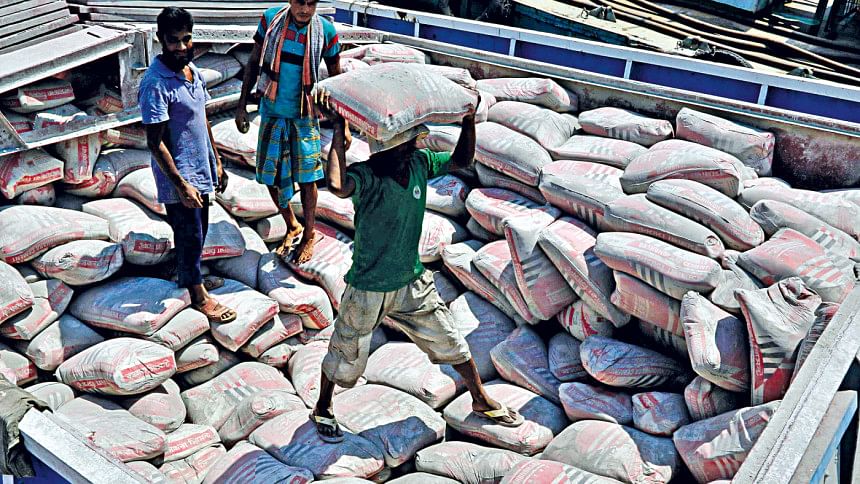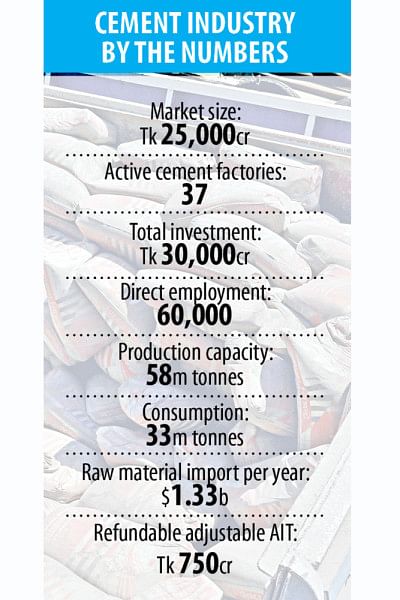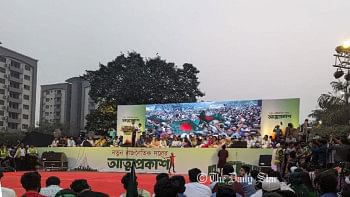Cement makers place fresh demands before NBR


Cement manufacturers have placed three new demands before the National Board of Revenue (NBR), including the payment of Tk 750 crore as refundable advance income tax (AIT), so that the producers can avail some assistance to cope with their losses amid the ongoing coronavirus pandemic.
Representatives of the sector asked for similar demands to be met in this year's national budget but were all turned away.
On 22 August, the Bangladesh Cement Manufacturers' Association (BCMA) sought a 60 per cent cut in import duty for clinker, the withdrawal of non-adjustable advance income tax and the return of previously paid refundable AIT.
"We import clinker at $38 to $42 per tonne but when we go to pay the duty, the customs always assume the price to be $50 per tonne, which is so unfair," BCMA President Md Alamgir Kabir said in a letter to the NBR.
Subsequently, the association called for import duties on clinker, a major raw material for the sector, to be brought down to at least Tk 300 a tonne from the existing Tk 500.
The country's cement makers are going through a period of hardship as they recorded almost zero sales during the two-month nationwide closure of all economic activities that began on 26 March to curb the spread of coronavirus.
"We are not getting back the refundable AIT despite applying for it repeatedly," Kabir said.
Although sales started to pick back up in June, the manufacturers are still operating far below full capacity.
"The sector is yet to return to full-swing as factories can utilise only half their production capacity for now," he added.
With this backdrop, the government should at least consider the demands as it would help the sector bounce back from the pandemic fallout. This includes the withdrawal of the 3 per cent non-adjustable AIT charge on imported raw materials.
Cement manufacturers collectively spent about $1.3 billion in fiscal 2019-20 on importing various production materials such as clinker, fly ash, iron slag, limestone, and gypsum.
Of these imports, clinker alone accounted for $900 million.
Overproduction has led to unhealthy competition in the sector, which is another troubling issue for manufacturers, according to Kabir, also the vice-chairman of Crown Cement.
Currently, 37 cement factories are operating in Bangladesh and they have so far invested more than Tk 30,000 crore, he added.
The sector has a combined production capacity to produce 58 million tonnes of cement annually against the local demand of about 33 million tonnes.
The sector's annual sales amount to about $3 billion, or Tk 25,500 crore. Of that consumption, 25 per cent is purchased for private use, 30 per cent is allotted by realtors and developers and 45 per cent is used for public sector projects, data from BCMA shows.
"We need a fresh injection of capital to recover the losses incurred due to pandemic. We have fallen in capital shortage as well. So, the government should refund our adjustable fund," said Mohammed Amirul Haque, managing director of Premier Cement.
The adjustable fund is worth about Tk 750 crore, which is badly needed under the current circumstances.
According to Haque, businessmen never reserve funds and instead always try to reinvest and expand their operations.
"We give the money to the NBR by taking loans from banks. Now we are paying interest to the banks whereas the NBR is not refunding our money over the years."
Haque alleged that some officials of the NBR create obstacles for industrialisation even though the prime minister intends to continue developing the economy.
NBR does not fail to take AIT from all cement manufacturers but is yet to refund the money over the years, said Asadul Haque Sufyani, chief operating officer of Bengal Cement.
"The revenue authority takes payment right down to the last penny but does not provide refunds when we rightly demand the money."
NBR does not pay interest even though it has blocked hundreds of crores in capital from numerous cement manufacturers, he added.

 For all latest news, follow The Daily Star's Google News channel.
For all latest news, follow The Daily Star's Google News channel. 



Comments